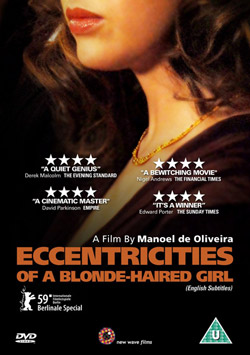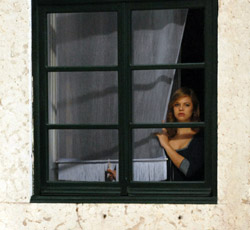
ECCENTRICITIES OF A BLOND-HAIRED GIRL (DVD)
New Wave Films
Release date: June 13th 2011
Certificate (UK): U
Runtime: 63 minutes
Original language: Portuguese with English subtitles
Country of origin: Portugal
Year of production: 2009
Director: Manoel de Oliveira
Writer: Eça de Queirós (short story), Manoel de Oliveira
Producer: Jacques Arhex
Cast: Ricardo Trêpa, Catarina Wallenstein and Diogo Dória
1908. The year the first Ford Model T was built. The year oil was first struck in the Middle-East. And the year that director Manoel de Oliveira was born.
Well into his one-hundred-and-first solar revolution the Portuguese director has made a refined, enigmatic curio, at 63 minutes too short to be a feature and too long to be a short. It is a diaphanous novella of a film which, though sometimes staid and tedious like the upper class it derides, also has the power to delight as it surprises.
Macário is a young clerk whose docile uprightness must meet the anxious straightness of his laces at ninety degrees. He works for his uncle Francisco, a wealthy textile merchant. Francisco is an austere unmarried man, the grudging bourgeois paterfamilias in a Dickensian mould, commanding duty and deference from his poor blundering nephew who scurries about the home they share with his head obsequiously bowed.
But when one day, gazing dreamily out of his office window, Macário beholds a girl posing wistfully in the lavish boudoir of a mansion across the street, the timorous young man is transformed into a torrid and wilful romantic.
She is Luísa, the daughter of a stilted matriarchal aristocrat, and he is enthralled by her exotic Old Worldliness. The august residence she keeps with her mother is festooned with ancestral portraits and foreign artefacts. The symbol of Macário’s obsession is a Chinese fan which the coy young woman flutters seductively at him from the gossamer veiled window of her room.
After a brief, punctilious courtship to harp music and poetry in her cultivated chambers, Macário asks his uncle for permission to marry Luísa. Francisco peremptorily rejects the request, perhaps owing to the intrinsic bourgeois aversion to aristocracy, but otherwise suspecting that the furtive young woman might be prone to “eccentricities” more sinister than charming…
Based on a story by nineteenth-century realist author Eca de Quieroz, the movie takes its mood from a decadent candlelit world of flowers and drapery. The patient, disciplined camerawork tallies with an epoch of formality, and painterly lighting accentuates the play of shadow to suggest the kind of secrets an outward show of propriety would wish to conceal.
But though aesthetically the film is spared the stark vicissitudes of modernity, its protagonist is not so lucky. Portugal’s economic crisis, which Macário allies to his own fate (“I am poor, and so are the banks”), is allowed to encroach on the fantasy with surprising results.
Mannered performances and genteel tension produce some grimacing comedy that borders on the surreal, and gothic undertones are brought out by a proposal that begins to look, in the shadowy squat Macário is reduced to, distinctly Faustian.
Some caricature and freakish twists also give the story the sense of orphic significance characteristic of fairy tales. And with the allusion to a mysterious stranger called Mr Eleutheria (Greek for “freedom”) it’s clear that Eccentricities is up to more than it might casually appear.
But whether it’s up to what it’s up to is up for debate. Some will see a monotonous patchwork of senile pretention where others applaud its subtlety, composure and historical sense.
I’m with the others. The aristocratic, bourgeois and (for want of a better word) “modern” factions seem to be cast in a sort love-triangular death-struggle, each an unwitting player in the inconclusive fable of twentieth century class relations. And what could be more natural for a director who has himself lived through it all?
To simultaneously see through the eyes of a cat and one of the true masters of horror and suspense, Stephen King; you’ll have to see the 1985 movie Cat’s Eye.
Howard Hawk’s 1946 Bogie & Bacall classic is playing at London’s BFI Southbank on New Year’s Eve. But what makes The Big Sleep a film noir classic?
Disney’s 50th animated film is a retelling of the Brothers Grimm Rupunzel. Locked away in a tower by the witch who stole her as a baby, she longs for freedom.
Based on the novel by John le Carre, Tinker, Tailor, Soldier, Spy sees recently retired MI6 agent, George Smiley (Gary Oldman) trying to uncover a double agent in MI6.
In the concluding part of our interview with West Is West’s producer, Leslee Udwin, we talk about the casting of Ila Arun and the possibilities of a third film.




















































































